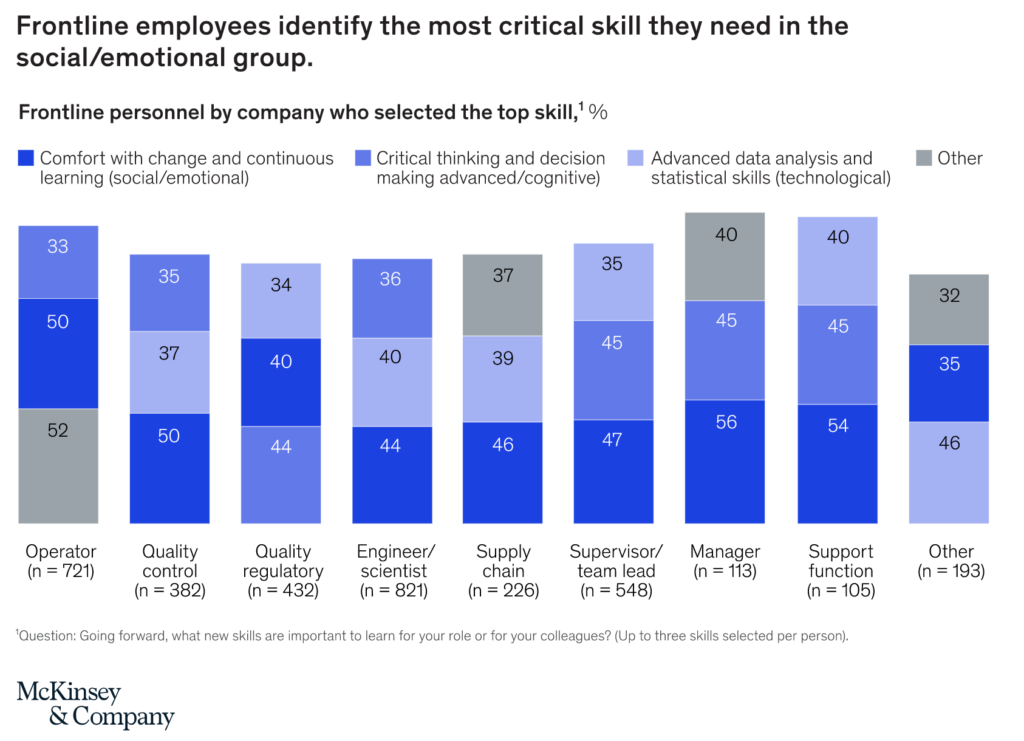Pharmaceutical Workers of the Future
2 minutes, 58 seconds read

In a time where technology is evolving at a rapid pace, has the pharmaceutical industry been able to keep up?
One could argue that the industry has been slow in their technological advancement when looking at their lab tests and data challenges, but there seems to be ample evidence pointing at dramatic growth in the industry.
In the next ten years, the pharmaceutical industry expects to see the creation of 90,000 to 120,000 new jobs with new skills in technology and data.
Despite incredible advancements in technology and methods, the pharmaceutical industry has always lagged behind the other manufacturing verticals in one aspect: lean.
Technological Tension
The fast-paced growth and scale of the fourth industrial revolution is creating a technological disruption, which affects operation across industries worldwide.
Pharma is faced with disruptions like new business models, which we see in developments like direct-to-customer sales or personalized medicine. These new trends generate a shift in the skill set operations workers need to have, forcing companies, and thus their employees, to learn new ways of working efficiently.
These changes can create tension, but also have a positive effect on patients, employees, and manufacturers. Despite this rapid growth, large pharmaceutical companies have yet to see a significant increase in inventory turns.
Digital Disruption
One of the biggest disruptors in pharmaceutical operations is advanced analytics and the digitization of the industry.
These disruptors have created a large skill mismatch, leaving frontline workers unequipped to handle the changing needs of the industry.
Digitization has had positive impacts on the pharmaceutical industry, allowing for more accurate data and data-driven or data-backed decision making. This has contributed to the job satisfaction of frontline workers, in which 70 percent have expressed having positive expectations for further digitization.
Skills and Solutions
However, less than 40 percent of companies have implemented solutions, and many are stuck in “pilot purgatory.” This directly affects their lean manufacturing.
Pharmaceutical companies are trying to use traditional methods like hiring or partnering, but with stiff competition from tech companies and start-ups, hiring is more difficult than ever.
As the demand for data analysis and science roles increases, the supply stays stagnant, rendering hiring ineffective and preventing pharmaceutical companies from riding the wave of advancement.
Companies should consider investing time into the resources they already have, their frontline workers, and provide them with new skills to increase productivity and production in a rapidly developing industry to achieve lean operational excellence.
Although pharmaceutical companies struggle to predict the talent gaps and skills that will be required of frontline workers as the industry progresses, workers cite data analysis, critical thinking, and decision making as important skills in their field. These soft skills are easily coachable and companies can address them through targeted programs.
Untapped Performance Potential
Although reskilling can create challenges like balancing other company demands, it is important for executives to be aware that their frontline workers are eager and ready to learn.
Frontline employees are intrinsically motivated to increase their productivity and skill set. They just need the organizational and management support to achieve their fullest potential in an ever-evolving industry.
Rever believes in the individual potential and ideas of frontline workers, and harnesses the power of these workers to elevate operational performance.
Through our digitized continuous improvement platform, frontline workers are able to learn and apply problem solving, critical thinking, and lean strategies in their every day duties. Learn more and request a demo here.
Like this content? Sign up for our Newsletter
[hubspot type=form portal=561211 id=fda6d445-739e-4072-8dae-68b94971a266]THE FRONTLINE DOJO
More Articles
How to develop the next billion Knowledge Workers
3 minutes, 51 seconds read
Digital transformation in manufacturing is not what you think it is
10 minutes, 36 seconds read
The human side of change management: lessons learned from Toyota, Airbus, and Silicon Valley
1 minute, 28 seconds read
The true meaning of Genchi Genbutsu
3 minutes, 5 seconds read
